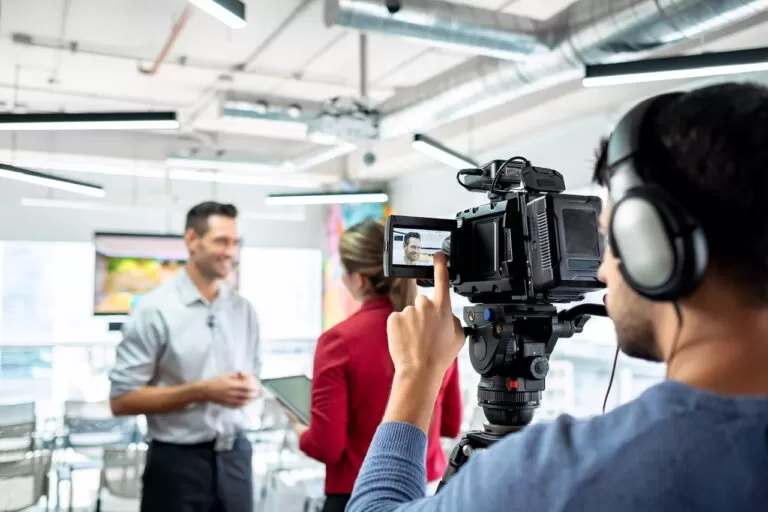Interviews and monologues are the soul of an effective corporate video. The impact of a real person looking through the screen to convey a genuine message is lasting and thought provoking.
Video production tools, software, graphics and special effects can merely enhance the influence of monologue delivery. They cannot replace it.
Authentic human expression is the defining ingredient of a good interview
The modern consumer is suspicious of exaggerated promises and gravely unforgiving when disappointed. Hence, the use of paid actors and models is increasingly discouraged in most corporate videos.
Particularly in case of B2B marketing, winning over the trust of an audience requires an actual representative of a business describing the values and motivation behind their work. Sincere words spoken by a relatable person is the greatest binding factor of the message in a video and gives it an edge over all other mediums of self-promotion.
Our team at Trueline Media has produced and directed many diverse corporate videos such as company profiles, product demos, brand promotions, testimonials, success stories and case studies to name a few. Interviews and monologues form a crucial part of all of them.
The biggest challenge in filming a good interview
Having interviewed hundreds of people, right from front line employees with entry-level jobs to members of the middle and senior management, we have seen nearly everybody freeze up in front of the camera under pressure. The likelihood increases if the person is facing the camera for the first time in their life.
As such, the onus is on the interviewer to make the respondents feel secure enough to be their natural confident self.
Your brand authority depends upon the conviction of those representing it
Our team faces the test to capture that conviction on camera before every interview. Experience helped us create an approach that is guaranteed to reveal the natural, fluent expression of all the interviewees.
We have personally tried and tested all the following practices. Adopting them will prove advantageous for virtual interview recording as much as on-site interviews.
Recommendation #1 – The ground breaking practice that will assure a good interview
Get a team member of your business to conduct the interview – As simple as it sounds, many of our former clients did not realize the magnitude of its impact.
It is fairly common to leave employees completely in the care of the video production team. More often than not, we have witnessed many clueless and worried interviewees who were left totally at the mercy of our DoP (Director of Photography). Most people don’t realize how intimidating he might look when he has a camera pointed to their face.
If the interviewer is a familiar person from the subject’s organization, it can quickly put them at ease to focus on their monologue. Interaction with a work-mate will renew the confidence in their speech and help them to overlook the surrounding strangers manning equipment.
Although the pressure and intensity of the environment is largely alleviated while recording a person virtually, the presence of the client or his stakeholder would still make a major contribution to obtain the best out of the respondent getting filmed.
Recommendation #2 – Plan and prepare the questions, the tone and the style of the interview beforehand
Spontaneity brings its moments of brilliance but winging it completely will never get you a memorable interview.
The interviewer needs to have a preplanned template of questions in accordance with a clear objective and nature of the video.
For instance, questions for a video meant to be shared only on social media will encourage an informal narrative. A senior executive delivering a leadership address should be prompted to project his drive and purpose. Employees participating in a recruitment video ought to be asked questions that elicit the emotions of pride, accomplishment and camaraderie.
Apprise the subject
The subject needs to be prepared in advance of possible talking points. Avoid handing them over the exact list of questions because we only want their answers to sound well thought-out but not scripted or rehearsed.
Do not wait till last minute to decide who will ask the questions
The interviewer needs to be informed and given time for research if he is not privy to the client’s objective for the video. The DoP needs to be briefed beforehand if he is expected to step in and conduct the interview.
Keeping both of them unaware will put an unnecessary strain on the production team as well as the interviewee. The subject and interviewer will go through multiple retakes ‘hoping’ it captures the ‘right’ sound bite. Not to mention lack of clarity will diminish their confidence.
- Determine a positive environment – Attitude is infectious. Everybody on set is working against the clock to get their work done but the pressure should not be evident in any interaction.
- Break the ice – If possible the interviewer should be introduced to all the subjects and connect with them through a casual conversation before the interview. Familiarity allows people to communicate more openly without awkwardness.
- Motivate the subject – Offer constant reassurance to help your interviewee get past any inhibition.
- Pay attention and listen carefully – The interviewer needs to have a list of open ended questions that draw out the subject’s story in terms of Who, What, Where, When, Why, and How, relevant to the topic of the corporate video. But, rather than making the respondent feel like they are being interrogated, guide them gently to elaborate upon the appropriate thought that might offer a unique perspective on the video’s overall message.
- Acknowledge the subject’s struggle – At times, the interviewee is likely to run out of thoughts or might speak sentences in quick succession. Pause before switching topics and hail your respondent’s effort, letting them know they are doing a good job.
- Ensure simple comforts – Sometimes the interviewees get uptight and hesitate to ask for a break to catch their breath or have some water. Remind them if they need a time-out to collect themselves.
- Minimize the crowd – The likelihood that the person delivering his monologue will get overwhelmed is substantially diminished by reducing the number of people watching over that person.
- Smile – People on the job don’t smile enough. Asking a question with a smile will draw the same warm and friendly response from the interviewee that we need to capture on camera.
- Don’t get daunted – Occasionally, we have to interview a person who is a notable dignitary in his field and that might intimidate the interviewer. One might hesitate to ask for a retake for fear of offending them.
Again, our advice is to appreciate the subject’s effort and politely request for a retake without hesitation. Remember that the dignitary is just another individual in front of the camera who needs the interviewer’s direction for his/her most becoming speech.
- Get the subject to face and answer a person instead of the camera – For the most corporate feel, we recommend long sided frames for an interview.



